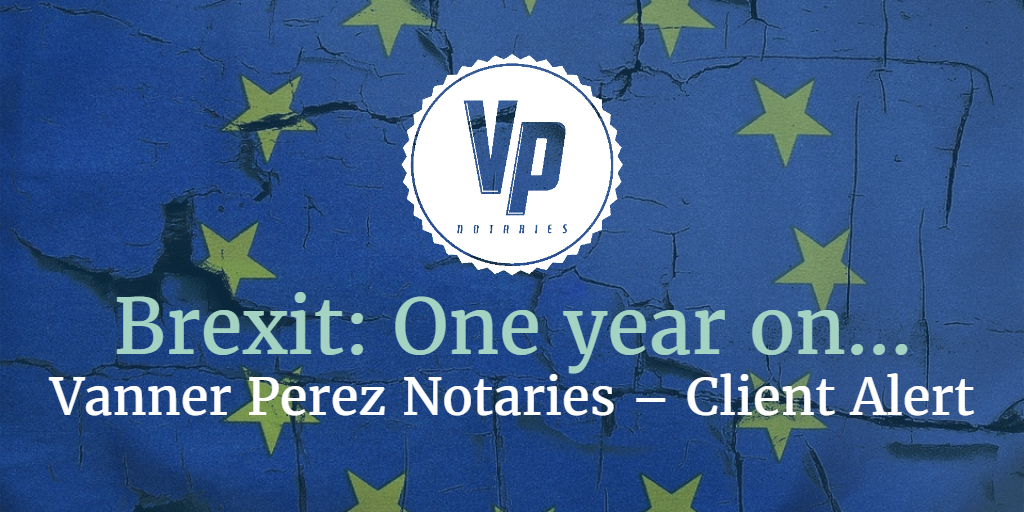 As Central London notaries, the team at Vanner Perez deal with all sorts of matters for all sorts of clients, ranging from certifying travel consent letters or notarizing documents for the USA, right through to notarising bills of sale for $100m superyachts. With that in mind, our experience as London notaries gives us an unparalleled insight into what is happening in London, both to individuals and also to businesses.
As Central London notaries, the team at Vanner Perez deal with all sorts of matters for all sorts of clients, ranging from certifying travel consent letters or notarizing documents for the USA, right through to notarising bills of sale for $100m superyachts. With that in mind, our experience as London notaries gives us an unparalleled insight into what is happening in London, both to individuals and also to businesses.
So, just over a year after Brexit, what’s changed? It’s clear that there have been winners and losers as this article in The Guardian shows. In this blog, we look at the effect that Brexit has had on our clients.
Brexit impact muted for global shipping market
London is one of the world’s foremost shipping markets. We specialise in the notarisation of documents for the sale and purchase of commercial vessels of all shapes and sizes. This sector has slowed down significantly since the financial crisis of 2008 and has still not recovered, with rates remaining extremely low owing to significant overcapacity. Given the global nature of the shipping industry, Brexit is a relatively isolated event that has not had much impact on the sector as a whole. The majority of movement in this market has been by owners seeking to rationalise their fleets, in most cases by scrapping vessels, as they look to improve profitability. Thus the demolition of vessels comprises a larger part of our work than ever before.
As for superyachts, sales and purchases have continued at a similar rate to previous years, and we’re aware of a number of very large yachts in construction, with delivery anticipated for 2018. Thus the conclusion would seem to be that Brexit hasn’t deterred many high-net-worth individuals from purchasing new yachts. There is also some hope that British yacht yards will find themselves more competitive in the future thanks, in part, to the weakening of sterling.
Outside of sale and purchase work, litigation seems to have seen a modest increase, probably brought about by such tight trading conditions. The high-profile collapse of the Hanjin Shipping line in August 2016 has seen us assisting clients in getting documents notarised and legalised for proceedings in South Korea.
Notarisation work continues apace in corporate sector
Outside of shipping, the initial flurry of mergers and acquisitions involving British companies, which was spurred by the weakened pound, has now slowed somewhat, although there are a number of M&A deals slated to take place over the coming months. These are cross-sector and seem to reflect the apparent value investors see in British businesses, particularly those that trade globally, but have their stock denominated in sterling. Much of the notarisation work is required post-completion, to update commercial registers and regulatory filings worldwide, for example, and so this flurry of market activity is still keeping us busy.
Although there has been much talk, post Brexit, of many large UK multinationals looking to transfer their European headquarters from London to the Continent, we are not yet seeing these plans being put into action. As the Brexit deadline draws nearer, we expect to see a marked increase in the notarisation of company documents relating to the establishment of new entities in other EU countries, in particular Germany.
Weakened pound driving sales of foreign holiday homes
For private clients, the most notable change, by far, has been a slowdown in the notarisation of documents relating to the purchase of holiday properties in Spain, Italy and France. With question marks hanging over what rights UK citizens will have within the EU after Brexit, coupled with a much-weakened exchange rate, the market is currently in decline.
On the other side of that coin, however, those who already have property within the EU are now looking to sell quickly to benefit from the favourable exchange rate. This would particularly seem to be the case for those people who own property in France, especially since property prices in that country have remained relatively stable; we receive enquiries almost daily to notarise powers of attorney to sell property in France.
Outlook
Overall it’s difficult to draw much of a conclusion, save as to say that there remains considerable uncertainty for businesses and individuals alike. As the negotiating positions on both sides become more apparent, this uncertainty should hopefully fade.
It is worth remembering that the requirement for notarisation is found in national legal systems rather than EU legislation. Therefore, whatever the future relationship between the UK and the EU, clients operating in European countries will still need to have their documents notarised and legalised to ensure they are accepted by foreign authorities.
If you’d like to discuss things in more detail, please contact Vanner Perez Notaries on 020 3668 6626 or email info@vpnotaries.co.uk to speak to one of the team.